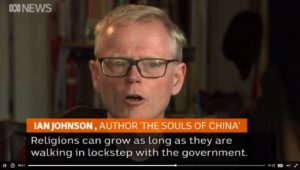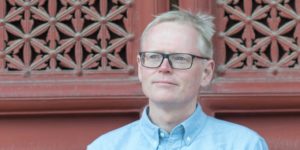 |
| Ian Johnson |
Ian Johnson:
Over the past few years, the authorities in Beijing have given churches across the country orders to “Sinicize” their faith. According to detailed five-year plans formulated by both Catholic and Protestant organizations, much of this process involves the predictable palaver of state control: “to actively practice core values of socialism, love the motherland passionately, support the leadership of the Communist Party, obey the law and serve society.”1
But the authorities want more than just political control; they want a say over Christianity’s spirit, too. According to one document, “Chinese styles” are to be promoted in the religion’s “building, painting, music, and art,” and also in Christian liturgy and theology. Other documents speak of reflecting Chinese traditions, but what this means isn’t exactly clear—perhaps filial piety, ancestor worship, and explicitly rejecting foreign influence.
While these new regulations affect China’s other religions too, they hit each one in different ways. They probably matter least to Daoism, which is an indigenous Chinese religion, and little to Buddhism, which is a global religion but has been in China for so many centuries that it has spawned local schools and practices. But for China’s other two main religions, Islam and Christianity, the rules raise serious concerns. In the case of Islam, the state’s aim seems to be mainly political control of sensitive border regions, because of the faith’s predominance among several ethnic minorities, especially the Hui and the Uighurs, who live in China’s far west.
Christianity poses a subtler and possibly more profound challenge. This is not only because it has spread among the ethnic Chinese, or Han, majority, who make up 92 percent of China’s population, but also because it has grown fastest not in remote border regions but in the cultural heartland and among white-collar professionals who are supposed to be leading China’s modernization. This makes Christianity the first foreign religion to gain a central place in China since Buddhism’s arrival two millennia ago. Hence the authorities’ unease and their vague desire for Christianity to become something Chinese and nonthreatening.
These concerns have arisen before. Christianity has had a presence in China for four hundred years. Missionaries such as the Jesuit Matteo Ricci got a foothold in the country by acting like Confucian officials: dressing in gowns, learning the formal language of classical Chinese, and downplaying differences between Christianity and Chinese thought. The Jesuits called God tianzhu, or “lord of heaven,” a plausible term for the Heavenly Father, but not coincidentally also the name of an old Chinese deity. Over the following decades, Christianity spread in North China by fitting into familiar folk religious patterns: offering moral precepts that sounded like Confucian principles or worshipping a virgin saint who seemed much like local female deities. Missionaries in this era, before imperialism made them arrogant, softened unfamiliar or disturbing ideas, such as Jesus’s crucifixion and resurrection.2
The new effort to sinicize Christianity is something different—and probably unique in its encounter with Asia. In years past, Chinese and other Asian governments were weak, and even if Christianity found followers it was later tarnished by the fact that missionaries arrived along with Western gunboats. Now we have a strong government in Beijing that accepts the reality of Christianity but wants it to conform to Chinese foreign and domestic policy. This isn’t unusual in Christian history—look at the innumerable British churches with tableaux and plaques that glorify British imperialism—but Beijing’s firmness is something new in Asia.The full review in the New York Review of Books.
Ian Johnson is a speaker at the China Speakers Bureau. Do you need him at your meeting or conference? Do get in touch or fill in our speakers' request form.
Are you looking for more stories by Ian Johnson? Do check out this list.
